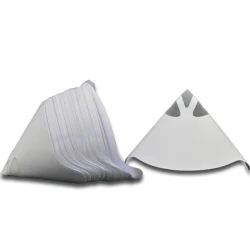Components and considerations related to filter funnels
2024-02-27
A filter funnel is a laboratory tool used for separating solids from liquids by the process of filtration. It consists of a conical or cylindrical funnel with a stem, and often, a short tube called a neck. The stem or neck is connected to a receptacle such as a filter flask or a vacuum pump, allowing the liquid to be drawn through the filter medium while retaining the solid particles. Here are key components and considerations related to filter funnels:
1. Material:
- Filter funnels are typically made of glass, plastic (such as polypropylene or polyethylene), or sometimes metal, depending on the compatibility with the chemicals and solvents being used.
2. Shape:
- Conical Funnel: Commonly used for general filtration purposes. The conical shape allows for efficient separation of solids from liquids.
- Cylindrical Funnel: Used in specific applications where a different geometry may be preferred.
3. Filter Medium:
- Filter funnels are used in conjunction with filter papers or other filtering materials. The choice of filter medium depends on the nature of the sample and the size of particles to be retained.
4. Filter Flask Connection:
- The stem or neck of the filter funnel is designed to fit into the neck of a filter flask or connect to a vacuum pump. This allows for the application of vacuum pressure to aid in the filtration process.
5. Ribbed Design:
- Some filter funnels have a ribbed design on the interior surface to enhance the flow of liquid and prevent the filter paper from sticking to the funnel.
6. Ground Glass Joint:
- In glass filter funnels, the joint between the stem and the funnel is often ground glass. This provides a tight seal when connected to the filter flask.
7. Fastening Devices:
- Some filter funnels come with a removable or snap-on filter plate or fritted glass disc that can be used instead of filter paper.
8. Capacity:
- Filter funnels come in various sizes, and the choice depends on the volume of liquid being filtered.
9. Chemical Compatibility:
- Ensure that the material of the filter funnel is compatible with the chemicals and solvents used in the filtration process.
10. Autoclavability:
- Some plastic filter funnels are designed to be autoclaved for sterilization purposes.
11. Disposable vs. Reusable:
- While glass filter funnels are generally reusable, certain plastic filter funnels may be designed for single-use.
Filter funnels are widely used in chemistry, biology, and environmental science laboratories for tasks such as separating precipitates, collecting particulate matter, or purifying liquids. The choice of filter funnel depends on the specific requirements of the filtration process and the nature of the substances being handled.



